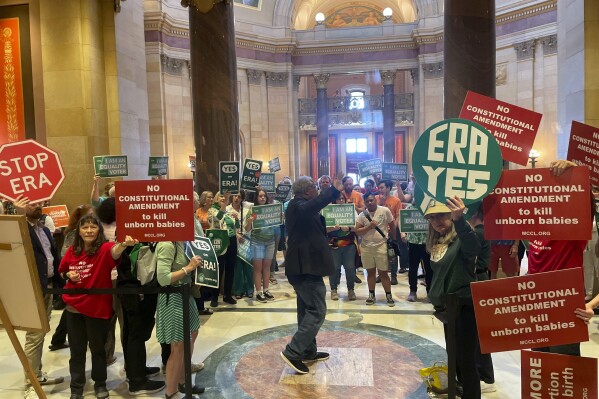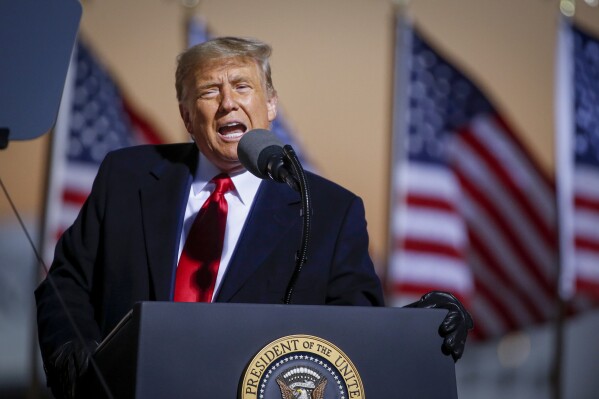GOP legislative leaders want Democrats to drop Minnesota ERA as part of session-ending deal
ST. PAUL, Minn. (AP) — Republican leaders of the Minnesota Legislature called Tuesday on Democrats to drop a proposed state Equal Rights Amendment, better fund rural ambulance services and make other concessions as part of their price for GOP votes on a public works package and an end to filibustering that has slowed the final work of the 2024 session.
Senate Minority Leader Mark Johnson and House Minority Leader Lisa Demuth complained at a news conference that Republicans have been shut out of shaping the major bills of the session and that they won’t supply the votes necessary to pass the infrastructure projects unless they’re heard.
Johnson, of East Grand Forks, told reporters that bipartisanship will be the most critical piece of any deal they might reach with Democrats who control both chambers of the Legislature, and the leaders indicated there’s room for negotiation.
“Bipartisanship is going to be the spoonful of sugar that makes this whole end-of-session session go down,” Johnson said.
The House and Senate can’t hold any more floor sessions to approve legislation except for those already set for Wednesday, Friday, Saturday and Sunday. While Monday is the scheduled adjournment date, lawmakers can’t pass bills that late. The day will be mostly for retirement speeches and ceremonial functions.



House Republicans showed Monday that they’re willing to drag out the proceedings to make their displeasure felt. They stretched what would normally have been a fairly routine debate on a “junk fees” ban to seven hours. After another long debate on an elections bill lasted until around midnight, it was too late in the day for the House to take up the Minnesota ERA proposal, which would add protections for abortion and LGBTQ+ rights to the state Constitution. It’s not clear when Democrats might try to bring that up again.
“When our constituents are completely shut out of the conversation, that does have consequences,” said Demuth, of Cold Spring. “We are willing to work with the Democrats to bring this session to an orderly close — if they are going to act like they actually want to work with us over the next four days.”
House Speaker Melissa Hortman, of Brooklyn Park, and Senate Majority Leader Erin Murphy, of St. Paul, said the GOP demands were unacceptable, and that Republicans have been part of the negotiations.
“Republicans have jeopardized the completion of important work by intentionally throwing up roadblocks and delays on the floor, in negotiations, and again today by attempting to score political points with the press and public,” the Democratic leaders said in a joint statement. “We appreciate the Republican leaders accepting our offer to meet, and hope they can come to the ongoing negotiations in good faith and with an earnest dedication to the best interests of the people of Minnesota.”
Democrats have been pushing for a capital investment package known as a bonding bill totaling around $980 million in borrowing and cash. Johnson and Demuth said Republicans want to hold it to $890 million. Apart from delaying proceedings, the bonding bill is one of the few pieces of leverage that Republicans have over the agenda. It takes approval by 60% supermajorities in each chamber for the state to take on more debt in the form of bonds. The narrow Democratic majorities mean some Republican votes are essential.
Republicans also want $30 million more for rural emergency medical services, but Democrats have resisted. GOP leaders also want assurances that Democratic Gov. Tim Walz will sign a bill that restores exemptions for religious organizations that were deleted from the state Human Rights Act last year as part of an expansion of transgender rights. They want Democrats to drop a proposal to allow the public to buy into the MinnesotaCare health plan that’s now limited to lower-income people. They want tweaks to the elections bill. And they want to limit gun safety legislation to higher penalties for “straw buyers” who purchase firearms for people who can’t legally possess them, while dropping Democratic proposals for stronger safe storage requirements for guns and a ban on “binary” rapid-fire triggers.
Disclaimer: The copyright of this article belongs to the original author. Reposting this article is solely for the purpose of information dissemination and does not constitute any investment advice. If there is any infringement, please contact us immediately. We will make corrections or deletions as necessary. Thank you.




